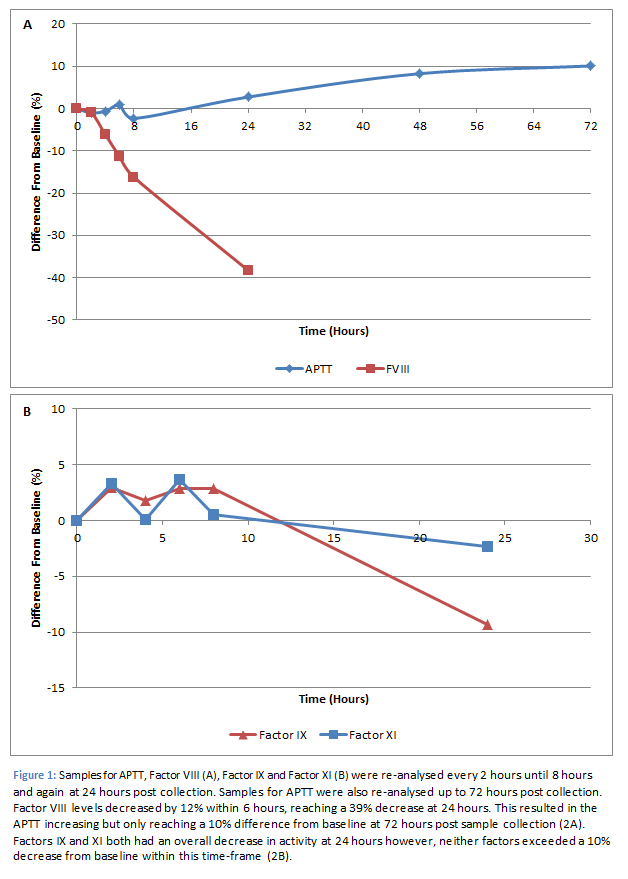Samples for APTT and Factors VIII, IX and XI were tested for a baseline level, re-tested at 2 hour intervals until 8 hours, and again at 24 hours, 48 and 72 hours (APTT only) (Figure 1).

Results for Factor VIII decreased significantly from 4 hours (p<0.01) and exceeded 10% from 6 hours onward reaching a 39% decrease at 24 hours (Figure 1A). However, this was not sufficient to significantly increase APTT results beyond 10% at this time point. APTT results did become significantly increased from 48 hours onward (p=0.02, and <0.01) and just exceeded 10% at 72 hours. Results for Factor XI did not change significantly over 24 hours (p>0.05) and did not exceed a 10% difference from baseline. Results for factor IX changed significantly from 6 hours onward (p<0.05), but did not exceed 10% difference from baseline within 24 hours (Figure 1B)
A recent study has shown that different APTT reagents have different sensitivities to clotting factor deficiencies with the APTT-SS reagent not showing significant increases until Factor VIII levels reach 38 U/dL [1]. All of our subject’s baseline results were normal for both APTT and Factor VIII explaining why a 39% decrease in Factor VIII levels did not influence APTT results significantly. Factor VIII has one of the shortest half-lives, in vivo (12 hours), compared to other haemostatic factors. Immediately after its release into the circulation, Factor VIII interacts with its carrier protein von Willebrand Factor (vWF), to form a tight non-covalent complex. vWF prevents premature association of Factor VIII with Factor IX, thus preventing formation of the tenase complex. As Factor IX levels only decreased by 9% over 24 hours, it would suggest that Factor VIII consumption was not due to premature activation but rather due to release of Factor VIII from vWF. This could have occurred via cleavage by Thrombin, which vWF does not protect Factor VIII from [2], and subsequent proteolysis of Factor VIII.
References
- Toulon P, Eloit Y, Smahi M, Sigaud C, Jambou D, Fischer F, Appert-Flory A. In Vitro Sensitivity of Different Activated Partial Thromboplastin Time Reagents to Mild Clotting Factor Deficiencies. International Journal of Laboratory Hematology. 2016; 38: 389-396
- Lenting PJ, van Mourik JA, Mertens K. The Life Cycle of Coagulation Factor VIII in View of its Structure and Function. Blood. 1998; 92(11): 3983-3986